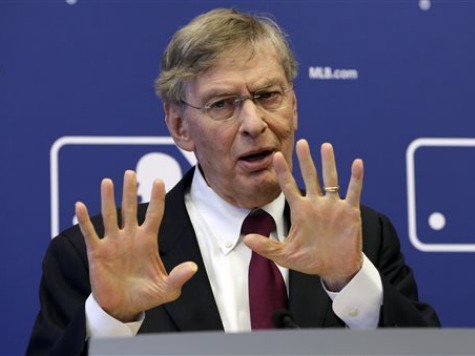
Major League Baseball’s owners will reportedly vote on August 14 on a new commissioner. The owners choose from MLB chief operating officer Rob Manfred, MLB executive vice president for business Tim Brosnan, and former Padres owner and current Red Sox chairman Tom Werner.
In other words, the owners of the thirty ball clubs vote to replace the former owner of the Milwaukee Brewers as commissioner with candidates from such diverse backgrounds as baseball, baseball, and baseball.
This wasn’t always how baseball operated. Imaginative owners snatched Bart Giamatti from academia, Happy Chandler from the U.S. Senate, and William Eckert from the ranks of retired Air Force generals. When baseball played as a bigger deal in the national consciousness, it didn’t act so small.
Yesterday offers evidence of the benefits for baseball in selecting its big man from beyond the sport. Today provides proof that baseball narrowing the search for its commissioner from within its ranks may further damage the sport.
We call baseball’s current head honcho Bud Selig. History will call him the Steroid Commissioner. Though Selig arrived at his office long after fans had assumed Jose Canseco arrived at his physique by means fair and foul, the commissioner waited for more than a decade to crack down on the defilement of the record books. Surely he had the support of dollar-chasing owners more than steroid-injecting players in procrastinating. After the lost season of 1994, baseball needed a boost and it obtained it through the juice. The Sosa-McGwire 1998 chase of Roger Maris erased the bad taste from the strike and put fans in the seats again. But, like steroids, the boost proved fleeting and illusory.
What worked in the short term disgraced baseball in the long term. Typical of any company-line bureaucrat, Selig talked much but did little. Major League Baseball’s first performance-enhancing drug suspensions occurred less than a decade ago, much too late to prevent the video-game statistics of McGwire, Bonds, and company from making a mockery of the record books, which, in baseball, read more as sacred scrolls than they do in other sports.
Selig served as commissioner longer than any other man save the first boss, Kenesaw Mountain Landis. The similar longevity in tenure invites comparisons between the two men. But the iron hand of Landis couldn’t have felt more dissimilar to the pillow punches of Selig.
Hired in the wake of the Black Sox scandal, Landis cleaned up baseball because he wasn’t beholden to it. As a sitting federal judge, he governed with a predictable imperiousness and impartiality that enabled him to look out for the game’s long-term interests even when they sometimes undermined short-term gains. Like steroids, gambling stained the integrity of the game. By making players in on the fix permanent pariahs, Landis put athletes on notice that cavorting with bookies could come at the price of a career.
Like the inflated numbers from steroids, gambling surely heightened interest in baseball. But it came at the price of legitimacy. “Now that I am in baseball,” Landis warned in 1921, “just watch the game I play. If I catch any crook in baseball, the rest of his life is going to be a pretty hot one. I’ll go to any means and to anything possible to see that he gets a real penalty for his offense.” Can one imagine Bud Selig, perhaps from the seat of a Cardinals-Cubs contest at Busch Stadium, saying any such thing in the late 1990s without laugh track accompaniment?
Kenesaw Mountain Landis and Bud Selig each lorded over baseball for more than two decades. That’s where the comparisons end. In the face of a threat to the game’s integrity, Landis acted and Selig waited. That defines their legacies.
What defined them in office was their relationship to the owners. One viewed himself their master; the other, their servant. Despite the very different results of their stewardships of the sport, baseball’s owners have opted for the Selig model of follower leadership over the Landis model of leadership without an eye toward the direction of the pack behind.
Some people just don’t know their own interests.

COMMENTS
Please let us know if you're having issues with commenting.